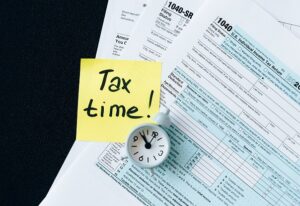Guest Blog:
Documents Required for Tax Season
Written By: Bob Freese, CPA – Principal at Vrakas CPAs

It’s the most wonderful time of the year. No, not Christmas, but tax season. Okay, so for most of you that time of year is not the most wonderful, but the most stressful as you try to figure out which documents you need to gather and wonder how long you need to hold onto them. Below I will summarize the most common documents needed and provide you with some guidelines on how long to keep them.
What Do I Need?
A tax return summarizes the income you earned during the year offset by any deductions or expenses paid during the year. For most of us that are still working, the main source of income is provided by your W-2. These are typically mailed out by your employer sometime in mid to late January. If you are self-employed, you may be receiving a Form 1099-NEC if someone paid you over $600 during the year for a service you provided them. You may also have support for the Schedule C that you file such as a QuickBooks file that summarizes your activity during the year for your business. If you own real estate and collect rent, a Form 1099-MISC may be issued to you from your tenants. Both Form 1099-NEC and Form 1099-MISC are mailed to you by the end of January. These documents are the most common for earned income or rental.
If you are retired, your main source of income might be from a retirement account. If you are taking distributions from a 401(k), IRA, or pension, you will be receiving a Form 1099-R. These forms should be mailed to you by your investment broker by the end of January. You could also be receiving Social Security. Form SSA-1099 is your Social Security benefit statement and is mailed to you sometime in January.
If you have invested your money in a brokerage account, you could have interest, dividend, or capital gain income. Depending on the complexity of your consolidated 1099, your form will be mailed to you on or before March 15. If your checking or savings bank account earned more than $10 of interest during the year, your bank will issue you a Form 1099-INT by the end of January. If you have any direct investment in a stock and that stock pays you a quarterly dividend, you will receive a Form 1099-DIV by the end of January. If you got lucky at a casino, you may receive a Form W-2G to report the gambling winnings. In some cases, you get this form on the spot. Otherwise, these must be mailed to you by the end of January.
If you invested in a company that is a pass-through entity, your share of income and deductions will be shown on a K-1 that you receive. The timing of when you receive your K-1 will depend on when the pass-through return is completed. If not extended, you would typically have your K-1 by March 15.
What About My Deductions?
One of the most common deductions is the real estate taxes you pay on your home. In Wisconsin, the real estate tax bills are mailed to you in mid-December. If you own property in Florida, these are mailed to you on November 1st. If you have a mortgage on your home, the bank will mail you Form 1098 by the end of January. Medical expenses are another common deduction. A summary of the premiums and other medical expenses you paid should be provided to your accountant. You should also provide them with a listing of all charitable contributions made. If you donated more than $250 throughout the year, the organization should have provided you with a letter documenting those donations.
How Long Do I Need to Keep These Documents?
The federal statute of limitations is three years, whereas the Wisconsin statute of limitations is four years. As a rule of thumb, we would recommend keeping all supporting documentation for at least seven years. After seven years, most supporting documentation can be shredded, but a copy of the actual tax return filed should be kept indefinitely. There are also certain other documents that should be kept indefinitely. These are items which may have future tax implications such as closing documents for real estate transactions, private investments made, stock purchases not maintained in brokerage accounts, etc. These are some items which may have a future tax consequence upon asset disposition. If ever in doubt about discarding supporting documents, it would be prudent to maintain such items.
Vrakas CPAs + Advisors has been providing certified public accounting and business advisory services since 1971. With nearly 100 professionals, our experience, size and resources enable us to provide services in a variety of areas including assurance, tax, computer consulting, business valuations and small business accounting.

